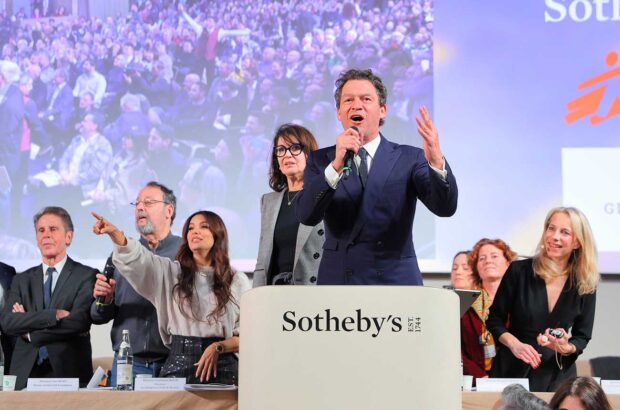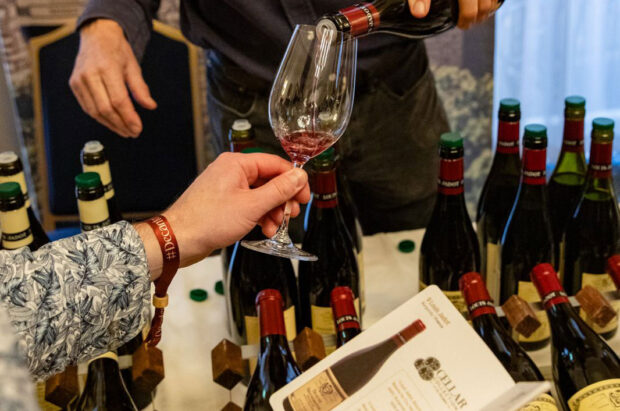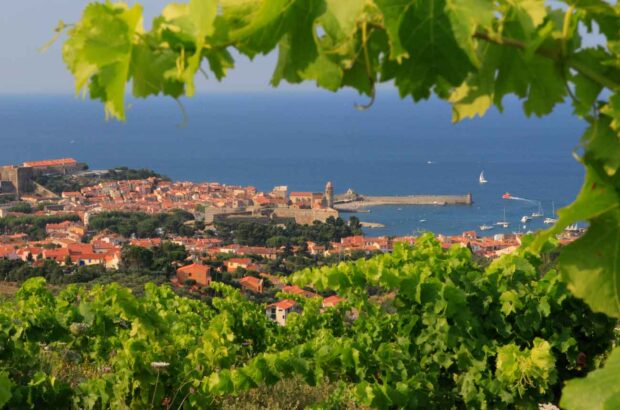The fields of late-summer sunflowers and ripe corn of the Great Hungarian Plain give way to the softly rolling hills, elderberry orchards and vineyards of Tokaj, and I spot the distant slopes of the Zemplén range, cloaked in oak. I ask my Hungarian friend what it was like here 30 years ago. ‘Like discovering the wreck of a ship that sank when communism came,’ he answers, smiling.
Now, Tokaj has never been more alive – the region is home to more than 200 wineries, from idiosyncratic ‘garage’ wineries to large, international brands. Ancient villages of white-walled cottages with terracotta roofs, interspersed with grand noble homes, tempt visitors with festivals, cosy family-run restaurants, walks among vineyards and oak forests, cycling and kayaking, castles, museums and adventures into the cool depths of 500-year-old cellars carved into the hillside. And then there is the wine…

Gróf Degenfeld castle hotel at Tarcal village
When to visit
The best time to visit Tokaj is from March to November. The harvest begins in September for dry wines, with the sticky, shrivelled aszú berries painstakingly plucked from the vines, one by one, from late October (see ‘All about Aszú’).
On the second Sunday of each month the Tokaj-Hegyalja Market at the Disznókő Estate offers homemade food, crafts, guided tasting sessions and live music, while late June brings the Jó éjszakát Mád or Good Night Mád wine and music festival in the village of Mád, spread among the premises of the village wineries, with local restaurants and cellars offering food and drink to a backdrop of concerts from choral through to jazz and world music lasting into the early hours.
In mid-October, Bodrogkeresztúr hosts the Mindszent Havi Mulatság or All Saints’ Merriment, with wine tastings, local cuisine, live music, arts, crafts and folk dancing in the evening.
The highlight of the year is Erdőbénye’s three-day Bor, mámor, Bénye or ‘Wine, Shine, Bénye’ festival in the second week of August. In the gardens and courtyards of more than a dozen wineries, visitors can taste wine and enjoy a wide selection of gastronomic offerings, literary events and guided walks, with evenings enlivened by concerts featuring everything from early music to experimental folk jazz.

Wine selection at Bobajka restaurant
Wine villages to visit
Designated in 1737 by a Royal Decree of Holy Roman Emperor Charles VI and now protected by UNESCO, Tokaj boasts a winemaking tradition that stretches back more than 1,000 years. A product of more than 400 extinct volcanoes, the region’s volcanic loess and tufa soils give Tokaji wines their richness, complexity and minerality. Regional figures for 2023 state that 5,195ha of cultivated vineyards are divided into 414 dűlő, or ‘crus’ (subject to some classification amendments due in the near future), with names such as Holdvölgy (Moon Valley) and Urágya (Lord’s Bed) redolent of ancient folk legend. Start exploring these wine lands by visiting these seven villages…
Tokaj
The town is the historic commercial centre of Tokaj’s wine trade. Begin your visit to the region with a trip to the Tokaj Wine Museum on the central square, then tuck into freshly fried fish from a hut by the confluence of the Tisza and Bodrog rivers. Drop by the Rákóczi Cellar for wines from Tokaj-Hétszőlő, an historic winery named after its seven ancient premier cru vineyards on the southern slopes of the Tokaj hill, and visit Demeter Zoltán Pincészet for some of the region’s best pezsgő, or sparkling wine. Next head to Dobogó, established by a scion of the Zwack family that makes Hungary’s famous Unicum bitters brand. The winery produces award-winning Aszú and experimental Pinot Noir wines. The historic cellars of Erzsébet Pince, dating from the 17th century and rented by Russian tsars to store Aszú wine purchased for the imperial court, offer excellent single-vineyard dry wines and Tokaji Aszú.
Mád
Mád is home to some of the iconic pioneers of Tokaj’s renaissance after the fall of communism in 1989. Szepsy Pincészet, founded by István Szepsy, one of the pioneers of Tokaj’s new dry white wines, and Royal Tokaji, co-founded by English wine writer and Decanter columnist Hugh Johnson, are among them. Admire the grand houses and carefully renovated synagogue before renting a bike and cycling around the historic local vineyards, or tasting handmade cheeses from local master cheesemaker Sándor Bodnár at Mádi Sajt.
Visit Barta for clean, elegant organic wines made in a traditional style with natural yeast fermentation in oak from grapes from vineyards on the historic Király hill. The winery and tasting room are housed in a listed heritage building. Opt for Holdvölgy for a treasure hunt-style tasting experience in the estate’s impressive, 2km-long, three-level underground cellars, trying its award-winning dry blends.

Szarkaláb, Mád
Tarcal
Walk up through the vineyards of the Gróf Degenfeld Kastélyszálló or Gróf Degenfeld castle hotel and winery (pictured, above) to the tiny 18th-century Terézia Chapel for lovely views of Tokaj hill and the village, with its twin churches. Revive yourself with a tasting of artisanal winery Basilicus’ red wine from the ancient Purcsin grape variety, or check out Stéphanie Berecz’s Kikelet or fabulous, floral whites.
Erdőbénye
Visit third-generation cooper Attila Hotyek to see how barrels are made, or in summer escape the heat with a walk past the village’s traditional stone houses and up into the cool forests of the Aranyosi valley. For an artisanal winery that encapsulates the bohemian spirit for which Erdőbénye has become renowned, don’t miss self-taught winemaker Róbert Péter’s Abrahám Pince.
Sárospatak
While less famous for its wineries, Sárospatak, once known as the ‘Athens on the river Bodrog’, is well worth a visit for its ornately housed Sárospataki Református Kollégium or Great Library, and to see the imposing 16th-century Rákóczi Kastély or Rákóczi castle. The nearby Hercegkút village was settled by Swabian immigrants in the 18th century and is famous for its ancient cellars, reminiscent of Hobbit holes (pictured, above).
Tolcsva
Formerly favoured by the aristocracy, Tolcsva, with its unusual wooden, onion-domed church, has more listed monuments than any other spot in Tokaj, including some spectacular mansions, such as the period-decorated Tolcsvai Szirmay-Waldbott Kastély or Tolcsva Szirmay-Waldbottmansion.
Bodrogkeresztúr
The shaggy nests of storks crown the telegraph poles in this ancient village with its 800-year-old church, which is the heartland of Tokaj sparkling wine production, a centre of folk dancing and home to the grave of 19th-century ‘miracle-worker’ Rabbi Yeshaya Steiner, which attracts up to 150,000 Orthodox Jewish pilgrims annually.
Bott winery, whose production facilities and tasting room are housed in a converted former ceramics factory, is well worth visiting not only for its characterful dry varietal wines from six historical sites and its fine sweet wines, but equally to experience the pure, infectious enthusiasm and hospitality of owner-winemaker Judit Bodó, one of the leading female winemakers in the region.
So much more to discover Samuel Tinon in Olaszliszka, southwest of Tolcsva, is the eponymous winery of veteran French winemaker Samuel Tinon, who formerly produced wines at Royal Tokaji. As well as being the region’s leading specialist in dry Szamorodni – Tokaj’s late-harvest white wine made from both fresh and botrytised grapes – Samuel also produces exceptional Aszú and delicious single- vineyard dry wines.
Outside Bodrogkisfalud, east of Mád, Patricius has revived a centuries-old family tradition of winemaking in Tokaj with a collection of current and historical grape varieties, creating a modern, streamlined range of Tokaji wines. Tokaj is not a region that yields all that it has to offer in the space of a single visit. Far from being a wreck on the seabed of history, it is a constantly changing, living expression of centuries of tradition. Each village and vineyard has a subtle character of its own that rewards the returning pilgrim who comes to marvel at and share in the restoration of its glory.
Planning your long weekend in Tokaj
Getting there
Take the comfortable, air-conditioned train from Budapest’s Keleti station to Szerencs (2hrs 30m) or Tokaj (2hrs 45m).
Getting around
The best way to enjoy the region is with an experienced guide. I recommend the knowledgeable and charming Gergely Somogyi of Tokaj Today. To explore on your own, take a taxi or, if you’re feeling more energetic, hire a bicycle and enjoy the quiet lanes and leafy hills.
Accommodation
Hotels
The village of Tarcal makes a perfect base and is home to the region’s best hotels. The five-star Andrássy Kúria & Spa offers luxurious rooms and suites, outdoor and indoor pools, an exquisite colonnaded spa, and a truly spoiling wine experience dinner in its excellent restaurant Bobajka (try the eponymous traditional dessert).
Alternatively, the grand 19th-century Gróf Degenfeld castle hotel with its elegant, high-ceilinged rooms and tranquil parkland setting surrounded by vineyards captures some of the genteel atmosphere of Tokaj’s past.
Stay at a winery
Besides fabulous wines, Barta in Mád has suites in the 18th-century Rákóczi- Aspremont mansion and a separate guesthouse. Also in Mád, Zsirai winery guesthouse has keenly priced rooms and a large wine terrace for tastings. In Bodrogkeresztúr, Tokaj Nobilis winery, one of several exciting woman-led wineries in the region, offers spacious guesthouse rooms with shared kitchens, while Füleky Tokaj boutique winery offers six ensuite rooms in a restored 18th-century baroque mansion.

Local & contemporary cuisine at LaBor Bistro
Where to eat
Enjoy locally sourced products at the charming home restaurant Szarkaláb in Mád, with its delightful vineyard views and wines from the owner’s winery, and at nearby Kardos Supreme, which offers a small, seasonal menu. At Dereszla in Bodrogkeresztúr, try inventive modern versions of traditional Hungarian dishes on a terrace overlooking the banks of the river Bodrog. LaBor Bistro on the historic central square in Tokaj town is also a great spot, with wine-pairing suggestions for its locally inspired menu.







